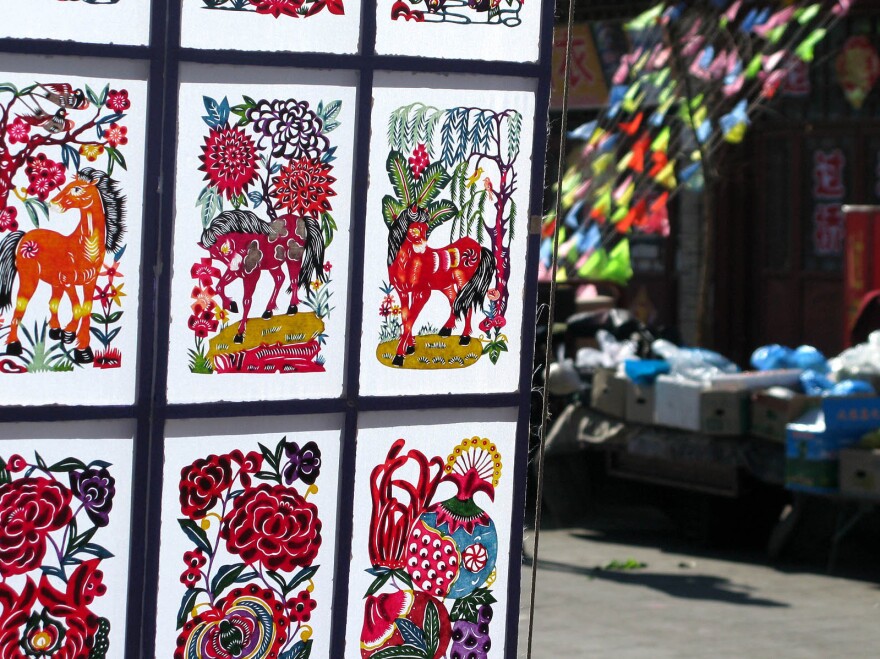China goes back to work Friday after a weeklong holiday marking the Year of the Horse. Traditionally, celebrations continue through the first month of the Lunar New Year.
As in years past, some 800 million viewers tuned in this year to the state TV New Year's gala program to watch Hong Kong actor Jackie Chan, French actress and singer Sophie Marceau, and other entertainers.

But many urban Chinese these days complain that the annual ritual of food, fireworks and TV song-and-dance shows is getting a bit stale.
Some now use the holiday to travel overseas. Others, meanwhile, head to the countryside in search of something more authentic.
Increasing numbers of Beijingers are driving west for about 3 1/2 hours to reach Nuanquan Zhen, or Warm Spring Town, famed for its folk customs.
The town is in a rugged area where ethnic Han people of the North China Plain fought, traded and mixed with Linhu, Loufan and other nomadic tribes of the Central Asian Steppe more than 2,000 years ago.
The town contains three walled villages dating from the Ming Dynasty (1368-1644). The villages' stone-paved streets have deep ruts made by centuries of cart wheels rolling over them. Stilt walkers and opera singers perform for the holiday crowds, while hawkers sell decorations and local snacks.

The town has traditionally been home to many blacksmiths, who made weapons — and devised their own way of celebrating the Lunar New Year.
Wang De is one of them.
In centuries past, wealthy people set off fireworks, the 50-year-old blacksmith says.
"People without money had to find ways to amuse themselves. So blacksmiths collected scrap iron from each family, melted it down and made 'trees and flowers,' " he says.
"Trees and flowers" — dashuhua in Chinese — is a visual metaphor. It refers to blacksmiths throwing the molten iron onto the walled city's gates to make sparks — a sort of poor man's display of pyrotechnics.
Wang learned the art — including how not to get hurt — from his father. He's the 13th generation of his family to practice this custom, and he's passing what he knows on to the young apprentices.
A couple of other locales in China have similar New Year's customs, but this use of city walls in Nuanquan was unheard of elsewhere in China, if not the world.

But Wang says that recently, the centuries-old tradition has been fancied up a bit.
"Since 2008, tourism here has taken off," he explains. "We now have a troupe that performs in front of a big screen. This custom has been continuously upgraded, and now it's much more interesting to watch than before."
After dark, Wang gets on stage and hurls ladles full of molten iron onto a replica of the city gate. The fiery liquid follows the arc of his arm and explodes into a dazzling shower of sparks that engulfs the whole stage.
That's not all. Backed by professional lighting and sound systems, young performers dance and sing the praises of the local food and liquor, and celebrate tourism's boost to their economy. The show is so elaborate, it practically rivals the state television New Year's extravaganza.

After the show, tourists Dong Wennong and Zhang Wenjuan stand in the crowded parking lot.
What did they think of the show?
"I would prefer this in its original style," Dong says. "It's too commercialized, too much irrelevant stuff."
"That city wall is fake. It's not the old kind — it's artificial," Zhang chimes in. "But," she adds, "everything is modernizing, and customs don't necessarily have to be clung to or repeated mechanically."
Showbiz or not, Chinese New Year's in the countryside is still different. Folks there make offerings to their ancestors, they decorate their doorways with red lanterns and calligraphy, they cook a special dish on each day, and they do it all with a sense of simple enjoyment and devotion to tradition that is seldom seen in the city nowadays.
And of course, if China's farmers and blacksmiths are now making their money by opening country inns and performing local customs for city tourists, it certainly wouldn't be the first country where that's happened.
Copyright 2021 NPR. To see more, visit https://www.npr.org.




